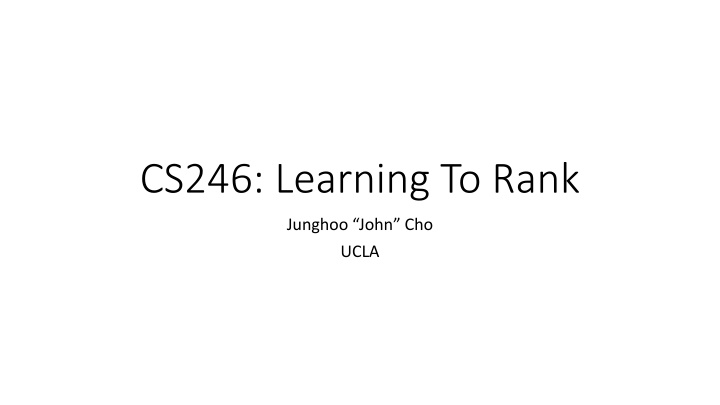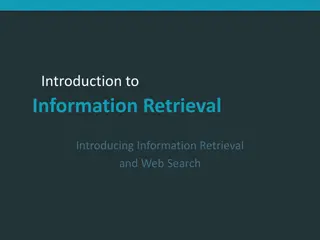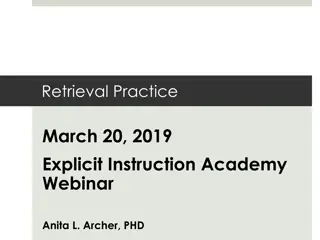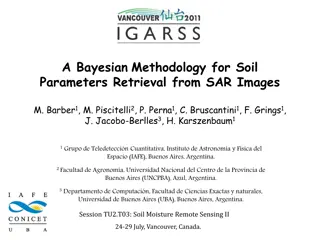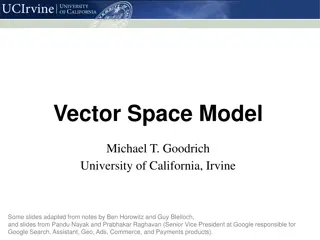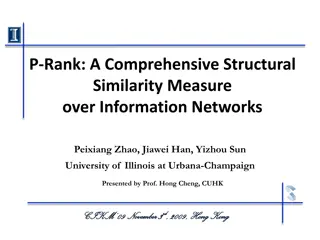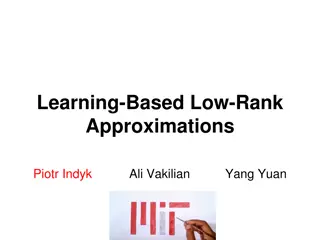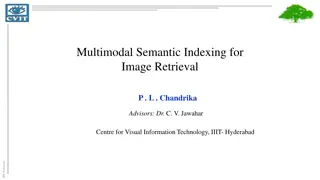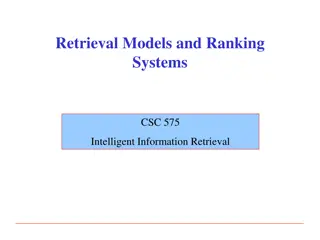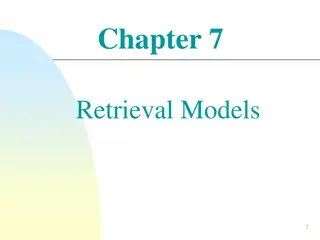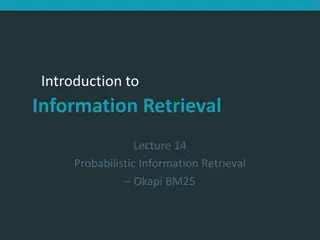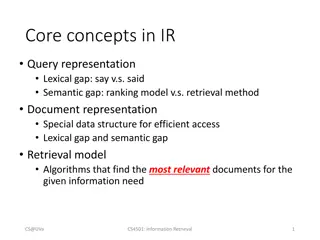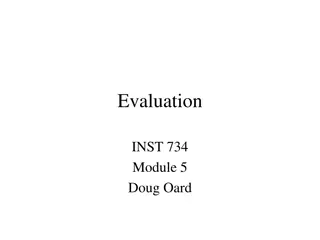Learning to Rank in Information Retrieval: Methods and Optimization
In the field of information retrieval, learning to rank involves optimizing ranking functions using various models like VSM, PageRank, and more. Parameter tuning is crucial for optimizing ranking performance, treated as an optimization problem. The ranking process is viewed as a learning problem where machine learning techniques are used to find the best parameter values based on benchmark queries. Linear regression and programming are common methods for optimizing rankings.
Download Presentation

Please find below an Image/Link to download the presentation.
The content on the website is provided AS IS for your information and personal use only. It may not be sold, licensed, or shared on other websites without obtaining consent from the author.If you encounter any issues during the download, it is possible that the publisher has removed the file from their server.
You are allowed to download the files provided on this website for personal or commercial use, subject to the condition that they are used lawfully. All files are the property of their respective owners.
The content on the website is provided AS IS for your information and personal use only. It may not be sold, licensed, or shared on other websites without obtaining consent from the author.
E N D
Presentation Transcript
CS246: Learning To Rank Junghoo John Cho UCLA
Where We Are Ranking Function: ? ?(?) = 1 ? ~ ? ? ? ? = 1)? ? ? = 1 ? ? ? ? = 1): query-dependent document score ? ? ? = 1 : query-independent document score Many different models exist for each part VSM (TFIDF), probabilistic model, LSI, LDA, PageRank, Hub and authority, pageviews, Q: How do we combine these different ideas? Example: ? ?,? = ?1????? ?,? + ?2??? ?,? + ?3?? ? + In general, ? ?,? = ? ? ?,?;?1, ,??, ?;??+1, ,?? 2
Tuning Ranking Parameters Q: How should we choose ?1, ,??? A: Ask Arturo? A: Try out all possible combinations Pick the combination that leads to the best result, say, under DCG@10 What we did as part of our project Q: 100 parameters, 1000 values per parameter. How many combinations are possible? A: 1000100= 10300. Scalability issue if many parameters Q: What can we do? 3
Parameter Tuning as Optimization Problem Given a benchmark query ?,? ? , let ? ?,?(?);?1, ,?? be the score of our ranking function at ?1, ,?? for ? under our evaluation metric, say DCG@10 Given benchmark query set , ??,? ?? , find ?1, ,?? that maximize ?1,? ?1 , ?2,? ?2 , ? ?(??,? ??;?1, ??) ?=1 4
Ranking as Learning Problem From the benchmark queries (= training data), the system has to learn the best parameter values Most machine learning problems are an optimization problem Q: How can we find optimal ?1, ??that maximize ? ?(??,? ??;?1, ??)? ?=1 A: Difficulty and the method to use depend on the exact form of ?(?,? ? ;?1, ??) 5
Linear ? ?,?(?);?1,,?? Example: ? ?,? = ?1 ????? ?,? + ?2??? ?,? + ?3?? ? benchmark set { ?1,?1,?1, , ??,??,??} Q: Minimize ?2 distance between? ??,?? and ??? ? ?1 ????? ?,? + ?2??? ?,? + ?3?? ? ?? 2 ?=1 A: Linear regression Important to have balanced benchmark set If ??= 0 for most ?, we may learn ??= 0 for all ?! 6
Linear ? ?,?(?);?1,,?? Example: ? ?,? = ?1 ????? ?,? + ?2??? ?,? + ?3?? ? benchmark set { ?1,?1,?1, , ??,??,??} Q: Minimize ?1 distance between ? ??,?? and ??? ? ?1 ????? ?,? + ?2??? ?,? + ?3?? ? ?? ?=1 A: Linear programming Q: What about nonlinear ? ?,?(?);?1, ,??? 7
Differentiable ? ?,?(?);?1,,?? Example: ?(?,?;?1,?2,?3,?4) = ?1????? ?,? + ?2??? ?,? benchmark set { ?1,?1,?1, , ??,??,??} Q: Minimize ?2 distance between? ?,?;?1,?2,?3,?4 and ??? ? ?(??,??;?1,?2,?3,?4) ?? ?3?? ? + ?4Recency ? 2 ?=1 8
Differentiable ? ?,?(?);?1,,?? Many optimization techniques exist as long as ? ?,?(?);?1, ,?? is differentiable for ?1, ,?? Gradient descent (GD), stochastic gradient descent (SGD), Broyden-Fletcher- Goldfarb-Shanno algorithm (BFGS), If ? ?,?(?);?1, ,?? is convex, global optimal values can be found If not, at least local optimal values Unfortunately, most evaluation metrics are not differentiable precision@k, MAP, DCG@k, Q: What can we do for nondifferentiable ? ?,?(?);?1, ,??? 9
Nondifferentiable ? ?,?(?);?1,,?? Option 1: Use an optimization method that works for nondifferentiable functions! Option 2: Approximate ? ?,?(?);?1, ,?? with something differentiable! Many different tricks and many different methods RankBoost [Freund 2003], RankNet [Burges 2005], LambdaMART [Burges 2010] (best so far), More detailed survey in [Liu 2009] 10
Summary We need to tune parameters in ranking function Given the large parameter space, search engines often apply machine learning techniques to find the optimal parameter values Challenge of nondifferentiability of common IR metrics Importance of constructing a good training set : Junk in, junk out Microsoft LETOR project Public benchmark dataset for learning-to-rank research 11
References [Freund 2003] Yoav Freund, Raj Iyer, Robert Schapire, Yoram Singer: An efficient boosting algorithm for combining preferences in Journal of Machine Learning Research, Vol 4, 2003 [Burges 2005] Chris Burges et al: Learning to Rank using Gradient Descent in ICML 2005 [Burges 2010] Christopher J.C. Burges: From RankNet to LambdaRank to LambdaMART: An Overview in Microsoft Research Technical Report, 2010 [Liu 2009] Tie-Yan Liu: Learning to Rank for Information Retrieval in Foundations and Trends in Information Retrieval, Vol 3(3) 2007 12
